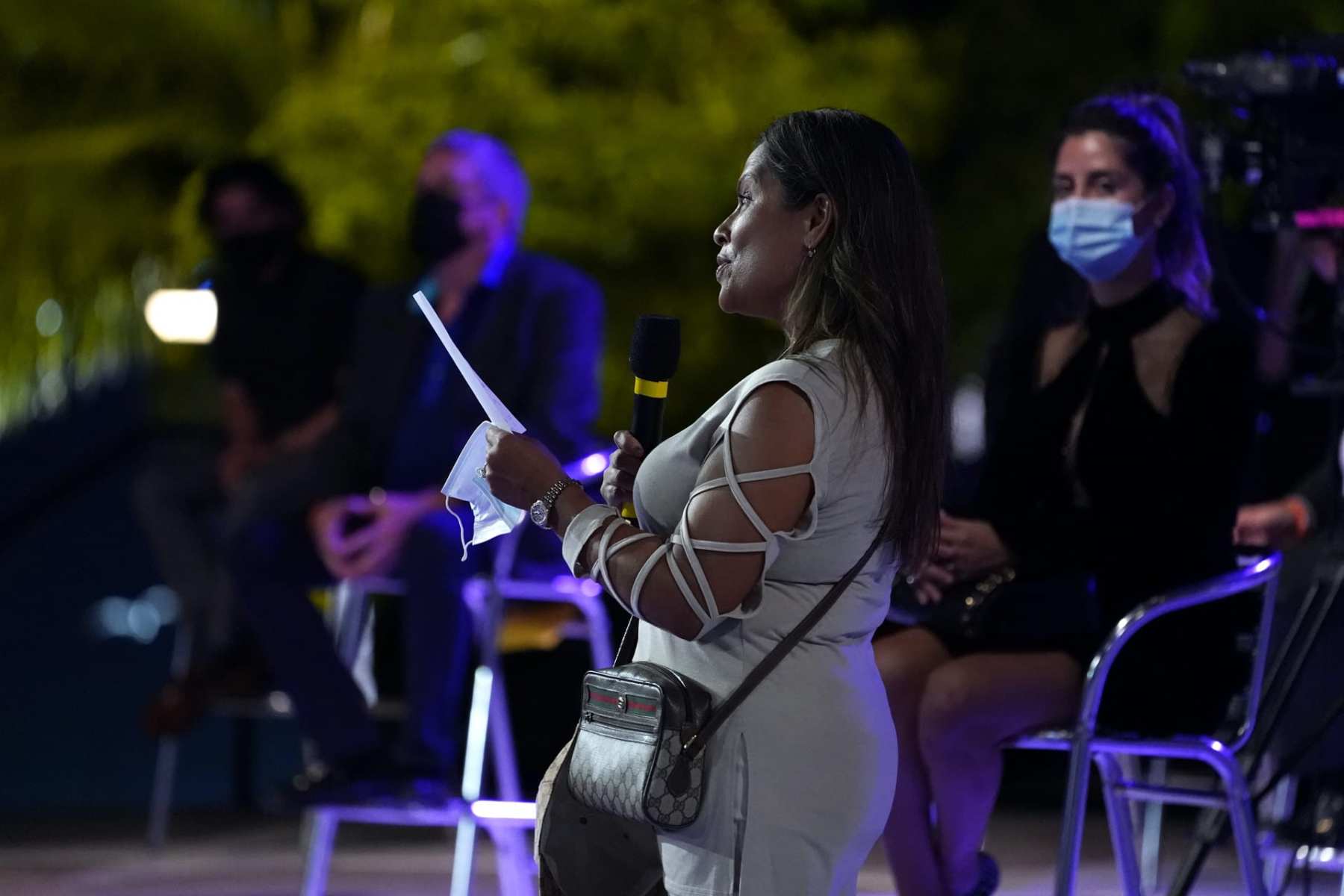In many ways, the second “presidential debate” could not have been more different than the first.
To start, it was not a debate. The initial town hall event with both President Donald Trump and Democratic nominee Joe Biden was canceled after the president refused to meet virtually, a request made after he was diagnosed with COVID-19 on October 2. Instead, the two candidates held competing town halls Thursday on their respective home turfs — Trump in Florida, Biden in Pennsylvania — at the same time on different networks.
The split screen effect created an opportunity to see Biden and Trump interact with voters instead of each other, a contrast to the first debate, when they sparred in an abrasive exchange that will long be remembered for the president’s refusal to denounce white supremacy.
In Biden’s town hall, of the 11 people to ask questions, only four were women. There were no questions about America’s first female recession, child care, education or reproductive health — all issues that disproportionately affect women voters.
His town hall did, however, mark a milestone in the campaign: it was the first presidential debate event to explicitly focus on issues affecting LGBTQ+ Americans.
The first such question, from Democratic voter Nathan Osburn, hinged upon Amy Coney Barrett’s impending Supreme Court confirmation. Osburn asked how Biden would address the concerns of LGBTQ+ people who are “very worried right now about erosions of their rights.”
Barrett’s ties to the Alliance Defending Freedom, which is designated as a hate group, has raised concerns among many LGBTQ+ people. Barrett has also misgendered transgender people and referred to sexual orientation as a “preference” — which some worry could suggest a rejection of sexual and gender minorities as a class of people to be protected under law.
“I think there’s a great reason to be concerned for the LGBT community. Something I’ve fought very hard for for a long time to make sure there’s equality across the board,” Biden said. The rest of his answer pivoted away from LGBTQ+ issues or protections, though, to focus on other implications if Barrett is confirmed, including the potential repeal of the Affordable Care Act.
Later in the evening, Mieke Haeck, a mother of two, asked Biden about what he would do to specifically to protect transgender people whose rights, she said, had “been attacked” under the Trump administration.
Biden said he would eliminate executive orders the Trump administration has issued to undercut federal protections for transgender people.
“There should be zero discimination. Too many trans women of color are being murdered, they are being murdered,” Biden said. “It’s up to, now, 17? Don’t hold me that number but it’s — it’s higher now?”
At least 33 transgender and gender non-conforming people have been murdered in 2020, according to the Human Rights Campaign. Most were Black or Latinx.
Trump, in contrast, received question after question from women voters in Miami Thursday night. Out of the 10 questions from the audience at the town hall, eight of them came from women — including a mother and daughter who approached the president together, leaning toward Biden and Trump, respectively.
Half of the questions from women were about health care, ranging from the pandemic to the future of abortion access.
During the president’s first town hall since contracting coronavirus, his answers surrounding the virus echoed earlier talking points, including touting his early travel ban from China when COVID initially surfaced. Trump — who has been reticent to wear masks in public throughout the pandemic — told voters that his position on the importance of wearing them had changed little since his own diagnosis. He said that though he was “OK with masks,” he had heard “many different stories on masks.”
As the future of Roe v. Wade, the landmark decision securing abortion access, was on many people’s minds during Amy Coney Barrett’s Supreme Court nomination proceedings, Trump did not say that he would prefer to overturn it outright. Moriah Greene, a “pro-life millennial” who is leaning toward voting for Trump, asked the president what protections he would put in place for people with high-risk pregnancies should Roe v. Wade be overturned.
Instead, Trump put the onus back on Barrett, his nominee.
“I would like to see a brilliant jurist, a brilliant person who has done this in great depth … make a decision, and that’s why I chose her. I think that she’s going to make a great decision. I did not tell her what decision to make,” he said.
But his toughest line of questioning came from moderator Savannah Guthrie. With only an hour of airtime, including commercial breaks, Guthrie took 20 minutes at the top of the broadcast to question the president about the timeline of his COVID diagnosis, which he could not offer complete clarity on, and the conspiracy theory collective QAnon, which the president claimed to know nothing about other than they are “very against pedophilia.”
Guthrie also managed to get the president to answer a question left lingering from his last debate with Biden: Would he denounce white supremacy?
When Guthrie pressed him on why he wouldn’t denounce white supremacy outright just weeks ago, Trump chalked the lack of clarity up to a media narrative.
“Why aren’t you asking Joe Biden questions about ‘why doesn’t he condemn Antifa?’” Trump asked.
“Because you’re here,” Guthrie answered. To which Trump added: “So cute.”
Additional reporting by Amanda Becker, Ko Bragg, Chabeli Carrazana, Errin Haines, Mariel Padilla, Barbara Rodriguez and Kate Sosin.




